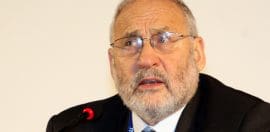Understanding How to Change the World

20 April 2017 at 8:00 am
Pro Bono News talks to Oxfam Great Britain senior strategic adviser Dr Duncan Green about his latest book, what attracted him to international development and how we can all change the world.
How does change happen in the world?
Despite claiming he doesn’t “like change”, Dr Duncan Green, Oxfam Great Britain’s senior strategic adviser, has set out to answer the question in his new book How Change Happens.
Drawing on insights from nearly two decades spent studying and working on international development, and using firsthand examples from the global experience of Oxfam, Green offers an understanding of how power and systems can shape social and political change.
“This book covers two things: how change happens anyway and then how deliberate attempts to influence change work and how they can be sharpened up,” Green says.
According to the introduction of the book, which was part-funded by Australian Aid, Green was moved to write by “a combination of excitement, fascination, and frustration”.
 He says the book builds on his earlier work, From Poverty to Power, which he describes as “an encyclopedia of aid and development”.
He says the book builds on his earlier work, From Poverty to Power, which he describes as “an encyclopedia of aid and development”.
“In the course of writing that I started to realise that I was seeing repeating patterns of change,” Green says.
“So if you are writing about change in a village, or change in a country, or change globally, certain patterns keep repeating themselves.
“I got very interested in that as a thing itself, and things like: change is discontinuous, it happens in sudden spikes, those spikes are often linked to big shocks and scandals and crises, change is often driven by alliances of people who don’t necessarily agree with each other but come together for a particular moment, change is national, and then more and more, in understanding the role of international activists and local activists in influencing those change processes.”
But Green, who has been in Australia to launch the book and feature in a series of public events discussing how social and political change happens, says the “hilarious thing” is he doesn’t like change.
“So you know I always go to the same shops and buy the same stuff and my wife gets really pissed off with me, I never try anything new, I’m not active anymore. I don’t join things, I’m not even on LinkedIn, I just like doing my thing. But I used to be an activist and my children are activists so I reckon I can live off them… I’m passive activist now, like a passive smoker,” he jokes.
He says it took him “a while” to start working in international development.
“First of all I was attracted to Latin America,” he says.
“I did a physics degree, totally irrelevant to what came next, [then after college] I backpacked around Latin America. I taught English in Argentina under the military, slowly got affected, got engaged with politics mainly by seeing horrendous stories from friends of mine in Argentina about what the military had done to them or their relatives, and then I had a sort of conversion moment where I was brainwashed by a lapsed catholic activist up in the middle of the Peruvian Andes, it was all very exotic. And then I came back to the UK and got involved in activism around Central America and moved into journalism… I ended up working in a publishers and think tank writing about Latin America.
“Then a mate of mine came round and said: ‘I want to talk about this job I’m applying for in CAFOD, the Catholic aid agency.’ And at the end of the conversation he said: ‘Well, actually I think you should apply.’ So I applied for it. I went into development when I was about 40.”
Green has since gone on to work at Oxfam and he is also teaches on international development at the London School of Economics, where he is a professor in practice.
He says understanding the “how” is essential for enacting change.
“There is a wonderful satire of British politics called Yes Minister,” he says.
“There is an incredible hapless minister and a very suave, manipulative civil servant and at the end of each program the civil servant gets the minister to do what he wants but the minister thinks it was his idea, and he says: ‘yes, minister.’
“And there is a moment in there where the minister says: ‘This is terrible, we must do something, this is something, so let’s do it.’
“If you do activism without reflectivism, without understanding the system in which you’re operating, you end up looking like the minister saying ‘we’re going to do a demonstration’, ‘we’re going to do microcredit’, ‘we’re going to fund a radio station’ and you have no idea why you are doing it. It is just because it worked somewhere else. It doesn’t mean it will work in this place. So I don’t think there is much choice really [you have to understand how it happens].”
And Green says once activists can understand how change happens, they can plan for it.
“The book argues that one of the features of change in these complex systems in which we live is sudden discontinuities, sudden spikes of change,” Green says.
“Some of those are what Donald Rumsfeld called ‘known unknowns’. So you know there is going to be an election, so you know there is probably going to be a new prime minister or president. If you are working on Zimbabwe, you know that Robert Mugabe is going to die one day. So these are things that you can sort of prepare for.
 “Other things are ‘unknown unknowns’. No one predicted the global financial crisis, some people predicted Brexit – there were only two possible options, it wasn’t rocket science that there was a plan a and a plan b – but very few people actually spent any time on plan b, which is pretty alarming. So even with a critical juncture as simple as that, activities were not that prepared.
“Other things are ‘unknown unknowns’. No one predicted the global financial crisis, some people predicted Brexit – there were only two possible options, it wasn’t rocket science that there was a plan a and a plan b – but very few people actually spent any time on plan b, which is pretty alarming. So even with a critical juncture as simple as that, activities were not that prepared.
“And the argument of the book is you can prepare, as far as is possible, and then you need an ability to scramble and respond rapidly.”
To illustrate how activists can plan for change Green gives the example of climate change.
“We know that in the UK there will be floods at some point in the west of England, it rains all the time, there will be floods,” he says.
“So if you are interested in raising awareness of climate change, and you believe, as I do, that you can attribute some part of those floods to climate change, what do you do?
“You can either, every time there is a flood go ‘oh there is a flood,’ you can make a little banner and say ‘this is climate change’ and you can stand in behind the newsreader and that, as far as I can see, is not adequate.
“Or you can say: ‘We know there are going to be floods in Somerset, this year or next year or the year after, so when those floods happen, we will have a week or maybe two weeks to get a message to the public about climate change. What is the most effective possible strategy? [Let’s] do some research, we’ll write a report, get it 90 per cent done, and then just fill in the details, and that report will look at how much can you attribute this flood to climate change, what’s been done on climate change, what hasn’t been done, what needs to be done next.’ You don’t need to wait.
“With advocacy it is often about the messenger rather than the message.
“So if you are trying to influence government, who will they believe? Will they believe bishops with enormous crosses round their necks, and imams, will they listen to scientists in white coats, will they listen to pop starts with enormous Twitter followings or all of the above? So let’s construct the alliance to have maximum impact, go and see them before the flood happens and say: ‘When the flood happens we will send the signal, we want to be out there standing up to our necks in water the day after and we will make a big impact.’
“So you can do this, but activists very rarely do.”
Green says for unpredictable changes “it is a bit more subtle”.
“You need to have the ability to drop what you’re doing and respond,” he says.
“There are people in NGOs that do that, they’re called emergencies people and they do it to respond to an earthquake or a cyclone or whatever, we need the same approach in advocacy and our long-term development where, if there is a window of opportunity like the Arab Spring or the global financial crisis, somebody in authority says: ‘Everybody stop, sit down, bring in some brains, what can we do at this critical juncture, let’s move people and money around if that is necessary and then we go back to work.’ And we don’t have that system at the moment.”
But Green says he hopes the book can start the conversation and help changemakers who are trying to overcome the same challenges.
“Another of the patterns that I recognised is that if you are in a company trying to improve the impact of your value change on workers in Cambodia, if you are in a government trying to sort out change in your department so it is more aware of what is going on, if you are an NGO, if you are a protest organisation, actually a lot of the challenges that you face are very, very similar,” he says.
“So the book is aimed at all those people.
“I call them all activists but that is not just the people out on the streets…[the book] explores the role of those intentional changemakers within all these big complex systems in which they work in, whether it is governments or civil society or private sector, changemakers face certain challenges and that’s who the book is aimed at.”
Green says international NGOs can work across different tiers of change.
“So the obvious one is global,” he says.
“So there are global collective action problems, global governance problems, climate change, tax evasion, arms trade, which one country can’t fix and you have got to fix them all together. And I think one of our strong suits [at Oxfam] is probably as a global organisation, we are in a good position to set up global campaigns like Jubilee 2000, the arms trade control arms campaign, which lead to the arms trade treaty, and we’re doing that on climate change and some other things. So that is one kind.
“Then the other kind is, there’s still massive imbalances of power, rich countries and poor, rich people and poor people and that means there is a role in terms of evening it up. So we’ve got a big campaign on inequality called Even It Up, but just seeing what… companies are doing in developing countries, whether they’re behaving themselves, that kind of question, so there is a kind of putting our own house in order piece.
“And then there is a final piece which is can we help people who are struggling for change in their countries, or should we actually just butt out? And there are big discussions on this… So the book is looking at how do you help. You are never going to be the lead part but as a bit part, how do you help these processes of change which go on all around us, in terms of how you spend aid, in how you do advocacy, in terms how you support local partners, lots of different things.”
 He says there is a place for NGOs to advocate for change.
He says there is a place for NGOs to advocate for change.
“We [Oxfam] didn’t used to do that much advocacy and what we realised was we were creating islands of success in a sea of failures and those successes were periodically swept away by bigger tides – tides of public policy, tides of choices by governments, tides of the behaviour of large corporations or whatever,” he says.
“So we decided to spend a proportion of our income, still only about 10 or 15 per cent, trying to fix the system at the same time that we were doing little things on the ground.
“And in terms of coherence and effectiveness, what else would you do?
“You want to create a system where your successes can flourish not create little successes which then get crushed by something that you are not allowed to work on. So I think just in terms of coherence and effectiveness, it doesn’t make sense to say that advocacy is not a good idea.
“If you had been doing a project in South Africa but you had not opposed apartheid, I think you would look pretty silly now. If you had been doing a sewing cooperative in India under the Raj, but refused to support Gandhi, how would you feel now? It is a very incoherent position.”
He says some of the most pressing issues in the world at the moment include climate change and an “othering” of other people.
“There are some existential threats like climate change and actually nuclear war, much underestimated in my view, and there is some potential threats that come from the response to these things,” he says.
“So I’m very worried that politics is going to fail in answer to climate change and we’re going to be left with a combination of renewable technology and geoengineering…and I’m worried about the differential impact they’re going to have on poor people and rich people. I’m worried if you dump a million tonnes of iron filings in the sea to make a big algal bloom which sucks the CO2 out of the atmosphere but fucks up fisheries, it’s not going to be off the coast of Australia, it is going to be off the coast of Africa or someone else who can’t stop it. So I think one of our roles it to foresee and think about those potential risks. So that is one of the threats.
“There is the more subtle threat – [to use] a word I was initially disgusted by but have now started using, of ‘other’ as a verb – of ‘othering’ other people. It’s when you decide that a group of people is not like you, is different and is somehow inferior and therefore it is ok to discriminate against them, to use violence against them, to generally not treat them as you would your family.
“And that process of othering is going on all around us based on religion, in India, based on crime waves in the Philippines, on immigration in Britain and Australia, on ethnicity and so I think we have a enormous challenge to find a way to reverse that and to change social norms, that idea of what it is to be human and how we should treat each other.
“I think we’ve been so obsessed with our little victories, we’ve lost sight of the big defeats. We’ve been playing around with numbers and statistics and evidence and policy while there’s been this retrogressive slide in our attitudes to each other. We need to get better at narratives, telling stories, creating a sense of human compassion and community, which we used to think was a bit hippy, a bit kumbayah, as we were doing the nitty gritty policy stuff.”
When asked about his ultimate goal for his work, Green says books are a good way of sharing what you have learned along the way.
“There is a nice Greek saying that you should father a child, plant a tree and write a book,” he says.
“So I’ve got two out of three… but these are just old man things about legacy. You have learned a few things you want to put them out there.
“Books are a lovely way of doing that, even better now, you can have a book and a blog so it is not ‘here are the tablets of stone, go away child and read them’, it is ‘these are my ideas come back and argue on the blog’ and that has just massively changed the dynamic of writing.
“So writing is much more of a conversation and that is brilliant. I put the whole draft of the book on the blog, 600 people downloaded it, luckily not all of them commented, but 60 or so sent comments, the comments were great, some of them were just ‘you have to include more of my issue’, which is standard, but lots of them were really good, I used some of them. It is just a much more satisfying way to produce text.”
To download a free copy of How Change Happens see here.








